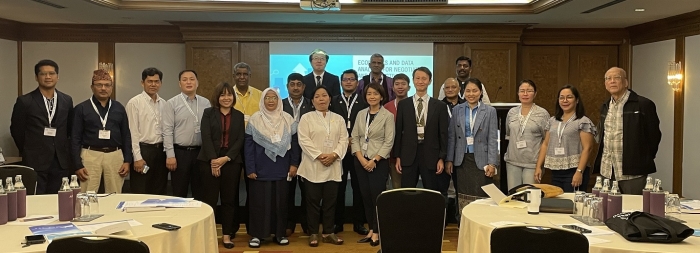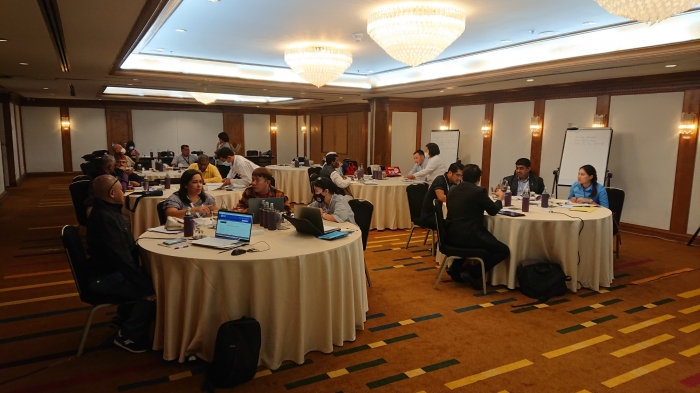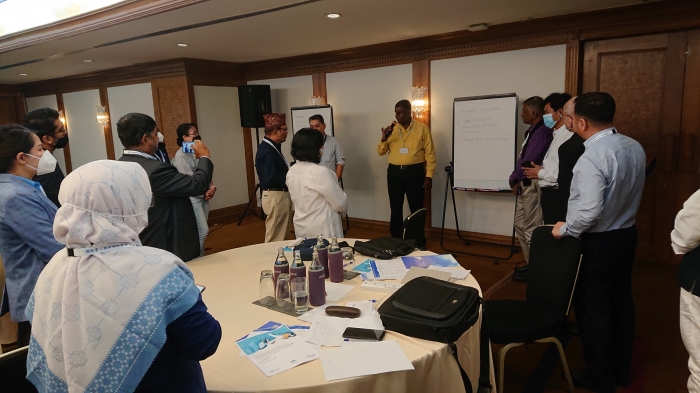JILAF/ILO Joint Multilateral Seminar on “Economic Statistics and Data Analysis for Building Constructive Industrial Relations and Labour-Management Negotiations & Consultations”
From November 7-11, the Japan International Labour Foundation (JILAF), together with the International Labour Organization’s Bureau for Workers’ Activities (ILO-ACFTU), held a multilateral seminar in Bangkok, Thailand. The seminar was attended by seventeen trade union leaders from the Asia-Pacific region (India, Indonesia, Cambodia, Sri Lanka, Thailand, Nepal, The Philippines, Malaysia, Mongolia, and Laos).
At the beginning of the seminar, Field Specialist Yuki Otsuji of the ILO Bureau for Workers’ Activities thanked JILAF and the Government of Japan, then gave opening remarks stating, “In the midst of various changes such as recovery from COVID-19, climate change, political instability, and a democracy crisis, it has become extremely important for the government, labour and management to build constructive relations in response to these changes. Through this program, I hope that you will learn to objectively analyze data and indicators, and develop stances based on your analysis, in order to enable the government, labour and management to build constructive relations.”
Next, JILAF Counselor Koji Kogure expressed his gratitude to the ILO and the participants, then presented the projects of JILAF. Following this, he made opening remarks stating, “Collective bargaining plays a role in mitigating the impact of the COVID-19 pandemic on employment and income, and helps to alleviate some of the effects on inequality while strengthening the resilience of enterprises and the labour market. This program is very much needed now under these circumstances. I would like you all to make good use of this important opportunity to act proactively. I hope that this program will prove to be rewarding to you and that it will help you to effectively address the problems faced by workers in your country.”
On the 1st, 2nd, and 4th days of the five-day program, JILAF gave lectures titled (1) “Response to the COVID-19 Pandemic – Lessons Learnt and Issues Concerning Employment and Industrial Relations,” (2) “The Spring Labour Offensive – Utilization of Economic Data, etc. in Collective Bargaining,” and (3) “Productivity and Profit Distribution: Cases in Japan.”
(1) In the lecture titled “Response to the COVID-19 Pandemic – Lessons Learnt and Issues Concerning Employment and Industrial Relations,” JILAF explained the issues in Japan’s labour sector before the pandemic and the impact of the pandemic based on various statistics. Following this, they explained specific activities of Japan’s trade unions, while illustrating them as examples of specific changes and responses to the pandemic.
(2) In the lecture titled “The Spring Labour Offensive – Utilization of Economic Data, etc. in Collective Bargaining,” JILAF first explained how the spring labour offensive in Japan is carried out, along with its structure, schedule, and purpose, etc. Afterwards, JILAF explained matters such as changes in results of the spring labour offensive, consumer price index, labour share, labour productivity, and other various related indicators and their impact on the spring labour offensive and minimum wage.
(3) In the lecture titled “Productivity and Profit Distribution: Cases in Japan,” JILAF gave an explanation about labour productivity, revealed the current state of labour productivity based on data, then lastly explained cases of improvement in labour and management in Japan.
In response to these lectures, the participants asked questions about a wide range of matters, including Japan’s minimum wage system, the social insurance system, collective bargaining, and the relationship between improving productivity and maintaining employment. Appropriate answers were then given to these questions.
At the end of the seminar, certificates of completion were presented to the participants, then closing remarks were made by Specialist Otsuji and Counselor Kogure on behalf of the organisers. To conclude the program, Counselor Kogure commented, “I think we have gained a lot of useful information and knowledge from the lectures and exchanges between participants in this program. In the future, we will be asked how we can put this information and knowledge into practice in our own countries and organisations. By all means, I hope that you will put what you have leant into practice and make use of it in your activities.”



